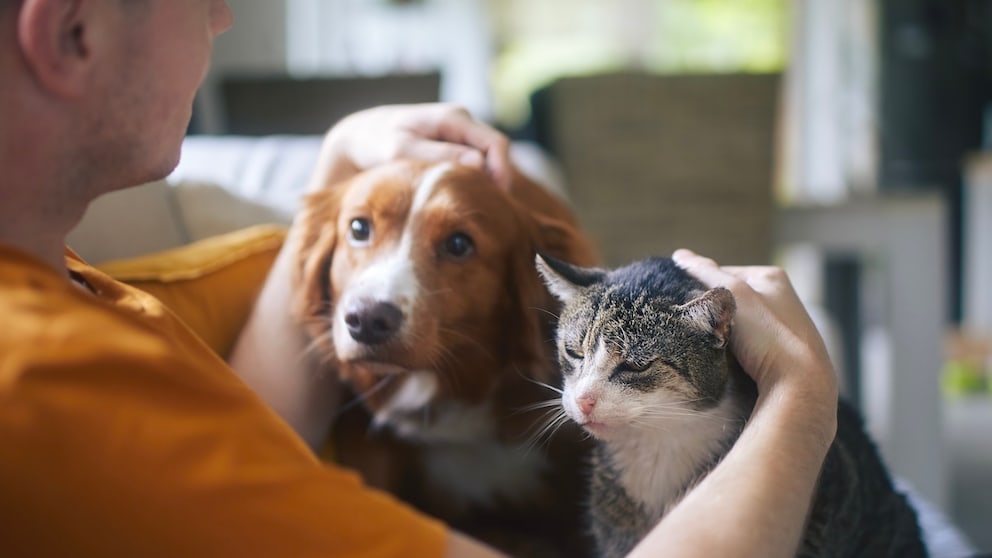March 24, 2025, 3:50 pm | Read time: 4 minutes
Dog owners are usually regarded as sociable nature lovers, whereas cat lovers are introverted individualists. But what is there to these clichés? Scientific studies suggest that there are indeed characteristic differences between cat and dog people. Another study has also shown that although the emotional bond with dogs can be closer, cat owners often find their relationship more pleasant.
When it comes to the character traits of pet owners, most of us probably have very specific images in our heads. Dog owners are seen as sociable, sporty nature lovers who like to be out in the mud with wellies in all weathers. Cat fans, on the other hand, tend to be more withdrawn and are at least as headstrong as their much-cited “velvet paw” — just think of the cliché of the “crazy cat lady.” But is there really anything to it? Do our pet preferences reflect our personality? And what are the findings from science? Are there measurable differences between dog and cat people?
What Makes Can and Dog People Tick?
Whether someone prefers dogs or cats could actually reveal more about their personality than you might think. Studies show that, on average, dog people are more sociable and conscientious, while cat people are more creative and independent. There are also research findings on the quality of the human-animal relationship that provide further exciting insights.
The question of whether cat and dog people differ in their personalities has already been scientifically investigated several times. A 2010 study by psychologist Samuel Gosling from the University of Texas was particularly revealing.1
Gosling conducted a large-scale online survey with 4,500 participants and analyzed their personality traits using the established five-factor model, which evaluates the following characteristics:
- Open-mindedness — openness to new experiences
- Conscientiousness — sense of duty and perfectionism
- Extraversion — sociability and communication skills
- Agreeableness — empathy and willingness to cooperate
- Neuroticism — emotional instability and vulnerability
The result: on average, dog people are more sociable, reliable, and conscientious than cat people. The latter are more inclined to question norms and are considered to be more creative and willing to experiment. However, cat owners are also more prone to negative emotions such as insecurity or fear.
Another study, conducted by Denise Guastello and colleagues at Carroll College in Wisconsin, came to a similar conclusion: cat people are often more creative, more unconventional, and less concerned with social norms. In addition, cat lovers tend to be more intelligent and sensitive, and sometimes they are actually loners. The personality of dog people tended to be more sociable, warm-hearted, and lively. They are more likely to follow rules than cat lovers and are more socially adaptable.2
The Quality of the Human-Animal Relationship
A recent study from Mexico examined the direct comparison between the relationship between humans and dogs and cats. For this purpose, 132 people who kept both dogs and cats were surveyed. The results show an interesting picture:
- Interaction: Cat owners spend more time interacting directly with their pets, such as petting or playing with them, than dog owners do.
- Emotional attachment: However, emotional closeness was perceived more strongly with dogs.
- Perceived costs: The relationship with dogs was rated as more costly and demanding than that with cats.
This results in an exciting finding: although the emotional bond with dogs is often perceived to be deeper, owners rate their relationship with cats as more pleasant overall. This could explain why the number of cat owners in many countries — including Germany — has risen in recent years.2
Do Our Pet Preferences Reflect Our Personality?
Some people assume that people — whether consciously or subconsciously — choose a pet that suits their character. However, individual preferences always play a role, of course. Some cat owners would find it hard to imagine going out with a dog no matter the weather.
Some dog owners, on the other hand, are amazed that cats follow their owners everywhere more often than dogs do. And still others simply don’t want to choose between their favorite pets and are both cat and dog people.
However, some studies have also shown general tendencies. Introverted and independent personalities are more likely to be attracted to cats, which are seen as independent animals. Sociable and conscientious people, on the other hand, prefer dogs, which are seen as strongly oriented towards their owners.
However, research shows that many pet owners do not fall strictly into one category. People who keep both dogs and cats often benefit from the respective strengths of both animals — from the deep bond with the dog as well as the uncomplicated and often calming interaction with a cat.


